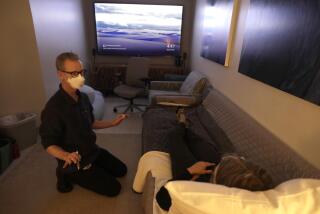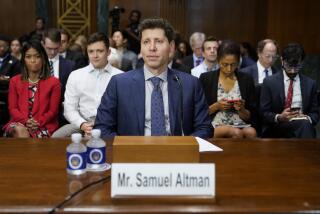Panel, Urging More Oversight, Backs Jarvik-7
- Share via
WASHINGTON — A federal advisory panel, in a qualified endorsement of the controversial Jarvik-7 artificial heart, recommended Friday that further experimental permanent implants of the heart be continued, but with more direct federal oversight.
“The panel unanimously voted to approve the continuation of the program,” said Dr. Charles McIntosh, chairman of the Food and Drug Administration’s circulatory system advisory panel. “The problematic areas and potential solutions have been identified.”
Dr. Robert Jarvik, the inventor of the device, left the panel’s meeting smiling and said: “I think this is a very workable way to proceed.”
Medical Complications Cited
The device, which has been implanted on a permanent basis in four men in the United States and one in Sweden, has been associated with strokes and other serious complications, and critics have questioned the quality of life for those who permanently receive the heart.
The FDA originally approved seven experimental implants to be performed by Dr. William C. DeVries, now associated with Humana Hospital Audubon in Louisville, Ky. But when problems arose after the first four operations, the agency asked for more data from the hospital and further study by the advisory committee.
McIntosh, reporting that the committee “did not come to any clear-cut conclusion as to whether the problems were device-related,” said that the panel decided that “the next three patients will provide valuable information.”
New Guidelines Urged
McIntosh, director of surgery at the federal government’s National Heart, Lung and Blood Institute, said that the panel will ask the FDA, which is not bound by advisory committee recommendations but generally takes them very seriously, to make the next three procedures contingent on the following conditions:
--That the FDA take a more direct oversight role in the procedures and review and evaluate each one before permitting the next one to take place, and that the researchers submit data to the FDA on a quarterly basis. The panel indicated it wanted greater dissemination of data on Jarvik-7 patients to the rest of the scientific and medical communities.
--That following each implant, the researchers update their plans for patient care regarding the treatment of stroke, post-operative bleeding, anti-coagulation problems and other complications.
--That the FDA consult with the panel in carrying out these provisions.
Flexibility in Emergencies
In the event of an emergency that requires an immediate decision to implant a Jarvik-7 without time to evaluate the previous procedure, McIntosh said that the panel recommended flexibility. “In an emergency,” he said, “we hope we can work things out.”
Jarvik added: “If a life-or-death situation arises, there is no formal prohibition of any kind.”
The advisory committee did not address whether the Jarvik-7 heart is worth its enormous cost, nor did it deal with the use of the device as a temporary life-sustaining “bridge” to a human heart transplant.
William J. Schroeder, who has lived longer than anyone else with the device, has suffered three strokes since he received the heart in November, 1984, and remains hospitalized in Louisville, unable to speak.
Dentist Barney B. Clark, the first recipient of a Jarvik-7, underwent surgery in December, 1982, at University Hospital in Salt Lake City and lived 112 days. He eventually died after several of his other organs failed.
Murray P. Haydon, who received his heart last February, continues to survive. Jack Burcham died 10 days after his April operation, and Leif Stenberg, who received the Jarvik-7 in Sweden in April, survived seven months.
Used in Terminal Patients
Jarvik told the advisory committee that the heart is only used “in persons facing immediate death from end-stage heart disease.”
He added: “We do not promise a better or longer life. In fact, we tell them their lives may be shortened.”
Nevertheless, he said, Stenberg “frequently left the hospital to go to dinner in restaurants, or to the park, or for a ride in his car . . . . He greatly enjoyed his life with the Jarvik-7 heart.”
But George Annas, an attorney and professor of health law at Boston University, disagreed. “The idea that terminally ill people are fair game is unreasonable,” Annas said in asking for a moratorium on further implantations. “An artificial heart cannot save their lives--only change the manner in which they die.”
Knowledge Seen as Sufficient
Annas said that enough had been learned from the first four procedures. “There is nothing magic about the number 7,” he said.
Una Loy Clark, Barney Clark’s widow, urged continuation of the program. Saying she spoke for the wives of all the Jarvik-7 recipients, she said: “They think it’s worth it. No matter what anyone says.”






